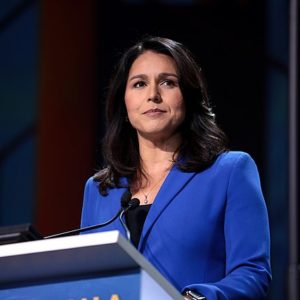Democratic presidential candidate Tulsi Gabbard filed a lawsuit against Google for $50 million over censorship claims, alleging that Google purposefully suspended her Google Ads account for several hours after Gabbard participated in the first presidential debates in June.
The move comes as conservatives continue to rally around President Donald Trump against Google over censorship concerns.
“We live in a time of unprecedented political upheaval and division in the United States. Uncertainty and mistrust in American institutions — most notably, the United States government—are at record highs,” Gabbard states in the lawsuit. “Everything from basic norms of civility and compromise to the sanctity of American elections suddenly seems in flux. Americans wonder how we got here, and they want to know where we’re going. …Google plays favorites, with no warning, no transparency—and no accountability (until now).”
Gabbard said her campaign “worked frantically” to try to understand why Google took the ad account offline, and claimed Google changed their answers several times before finally reinstating the account.
“The explanation for Google’s suspension of the account at exactly the wrong time is no great mystery: Google (or someone at Google) didn’t want Americans to hear Tulsi Gabbard’s speech, so it silenced her,” according to the lawsuit. “This has happened time and time again across Google platforms. Google controls one of the largest and most important forums for political speech in the entire world, and it regularly silences voices it doesn’t like, and amplifies voices it does.”
Google clarified several times in past hearings that no one person controls which accounts or content gets taken down — algorithms control most moderation, and sometimes algorithms make mistakes.
According to the lawsuit, the Gabbard campaign purchased a large number of ads in response to a spike in Google searches about Gabbard after the presidential debates. A tech lobbyist familiar with the matter said it makes sense why Google would suspend her ad account in response because a sudden large purchase looks a lot like fraud. A Google spokesperson also told the New York Times said Gabbard’s purchase triggered automatic suspension over fraud concerns.
Gabbard claims Google “silenced” her because she frequently criticizes Google and its business practices. When Democratic presidential candidate Elizabeth Warren called for the break up of Big Tech companies (including Google) back in March, Gabbard tweeted her support of the policy position.
Warren followed up her call to action with Facebook ads, which Facebook temporarily suspended for copyright infringement because she used their logo. The ads were later reinstated. Warren didn’t react the same way as Tulsi, instead tweeting to Facebook, “Thanks for restoring my posts.”
“Now that Google is facing increased antitrust scrutiny, Google has made common cause with the conservative Koch Foundation, funding several conservative groups in the Koch network to publish op-eds, studies and white papers opposing antitrust investigations of Big Tech,” Gabbard argues in the lawsuit.
Gabbard also referenced Google’s efforts to block conservative media outlet Breitbart from advertising through Google.
“It’s important to note that Breitbart has been among Google’s staunchest critics, alleging that the company routinely censors conservative viewpoints,” she said.
But a conservative lawyer thinks Gabbard’s lawsuit is just a cry for attention.
“It has so many problems it’s hard to know where to begin,” attorney Gabriel Malor tweeted. “First, the Gabbard campaign says Google Ads is a state-created public forum and therefore subject to the constraints of the First Amendment. (Nope.) The campaign also says Google is subject to free speech and association rights protected by the California constitution. (Also, nope.) The campaign thinks, apparently apart from the debate-night issue, that it can hold Google liable for publishing misleading and deceptive ads of third parties. (Nope. See CDA § 230.)”
In March, Rep. David Nunes (R-Calif.) sued Twitter over censorship and defamation claims, but lawyers also dismissed his case as “frivolous” and a distraction from what they see as the bigger issues with Big Tech, like privacy violations and anti-competitive practices.

